
The
UNEXPLAINED
Mysteries of Mind Space and Time
 |
The
|
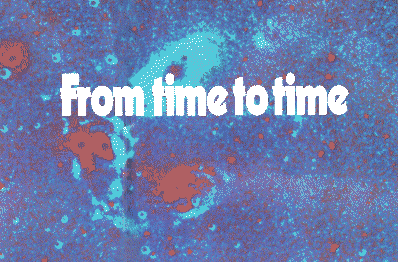
Most of us believe that time flows along steadily 'like an ever-rolling
stream'. But modern science is discovering that the reality may be far more
complex - and that time travel may be physically possible.
JOHN GRIBBIN reports
WE ARE ALL TIME TRAVELLERS, moving a certain distance in time with every full rotation of the Earth - a distance that is generally shared by everyone else. That is the reality of our everyday lives - but who has not speculated on the possibility of varying this steady progress, so that we either speed up while everything around us seems to move more slowly, or somehow drag our feet so that everything hurries by while we are left behind? And what of the possibility of travel backwards down that same road, to visit the past and even, perhaps, to alter it? Even if physical time travel is impossible, or impracticable, what about the possibility of communication across time, in the form of dreams, visions and ghosts from the past?
Surprisingly, perhaps, science does acknowledge the possibility of physical time travel, in certain circumstances. This, however, demands a new way of looking at reality. To provide a bridge between our everyday experience of time rolling steadily forward and the bizarre possibilities that stem from abandoning this common-sense view, it is best to look first at some of the puzzles and paradoxes inherent in the possibility of time travel. The discovery of a paradox, to the unimaginative, demonstrates that time travel is impossible. To the truly imaginative, however, a paradox is a challenge to find a more radical solution.
Scientists have had to become accustomed to doing without common sense. The idea of a steady flow of time is already outmoded by experiments involving particles that travel at speeds close to the speed of light, under conditions where Einstein's theory of relativity, far removed from the usual world of common sense, provides the best description of how the Universe works. Time, like space, is elastic, not rigid, and Einstein's description involves a blending together in which time and space are seen as two sides of the same coin, a coin dubbed 'space-time' (see page 42). Both time and space can be stretched and squeezed, depending on circumstances, and time can be traded for space as long as the appropriate total balance is maintained. This is all solid, sober scientific fact.
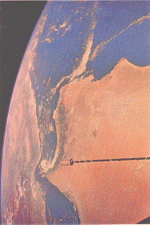 |
Science is based on the notion of causality: that events follow their causes - a bullet leaves the gun after you pull the trigger, not before. But what if, seeing the bullet in flight (right), you were able to travel back in time and prevent the trigger being pulled? Such problems have led some scientists to reject the possibility of time travel. Yet one day the invention of a working time machine may provide as forceful a refutation of their view as this space photograph of the Earth (left) does of the idea, held by most medieval scholars until the 13th century, that the Earth was flat | 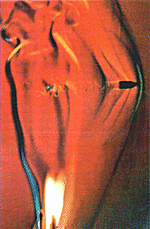 |
Relativity theory is confirmed by the direct measurement of what happens to sub atomic particles whirled at huge speeds inside modern 'atom-smasher' machines - accelerators. It is fact, not speculation, that such a particle has a longer lifetime than a stationary counterpart; and it is fact that an astronaut sent on a journey at a speed that is a sizeable fraction of the speed of light- 186,000 miles per second (300,000 kilometres per second) - ages less than the rest of us left behind on Earth.
Another way to stretch time, entirely within accepted modern scientific thinking, involves sitting in a strong gravitational field- the sort of gravitational field you might get near a sizeable black hole. This does not necessitate travelling through the back hole, just sitting in its gravitational field and watching the Universe go by, seemingly at a speeded-up rate. Both tricks are forms of time travel - they get the intrepid astronaut into the future 'faster' than the usual rate. But if he doesn't like what he finds there, there is no way home.Time may not be a steadily flowing stream, but even within the framework of modern science it is usually regarded as a one-way street. Hurrying forward may, just, be possible; bucking the stream and swimming back into the past just isn't on. The reason why such possibilities are dismissed lies in the existence of certain paradoxes. And the best way to get some idea of the paradoxes and possibilities is to look in the pages of science fiction.
| Right: a Van de Graaff electrostatic accelerator at the Atomic Energy Research Establishment at Harwell, Oxfordshire, England, used to speed subatomic particles to high velocities. Experiment has shown that such particles have longer lives than their stationary counterparts so that, for them, time passes more slowly | 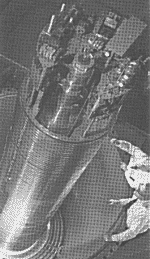 |
The key to the discussion is causality - the seemingly logical assumption that events always follow their causes, in an orderly procession. A bullet leaves the gun after the trigger is pulled, not before; the results of the 3.15 at Ascot reach us only after the race is run, not in time for us to be able to rush round to the betting shop and make a killing. The logical implication is that if time travel involves violation of causality, then it must be impossible. If a theory tells us we can commit suicide, then go to a restaurant and enjoy a good dinner then, the argument goes, there must be something wrong with the theory. This is not a scientific proof or disproof. It is a matter of philosophy and logical argument - and the Universe may yet hold a few surprises for logicians.
But the science-fiction philosophers have their own answers to these paradoxes, and their version of the debate highlights two possibilities - branches and loops in time. The hoariest example of a time travel paradox, science fiction or philosophy, concerns a traveller who goes back in time and, wittingly or unwittingly, prevents the birth of the person who would have been his grandfather. If so, he could never have been born himself; so it must be the case that the grandfather was born, after all; so it was possible for our hero to go back in time to prevent the birth of his ancestor . . . and so on. The existence of the paradox is seen by many people as proof that time travel is impossible. Just as nature was once said to 'abhor a vacuum', now we might say that she 'abhors time travel'. But it is very easy to imagine resolutions to this simple paradox in which the grandfather is both born and not born, the grandson both exists and does not exist. The simplest answer is that the effects of the time traveller's activities are already rooted in the fabric of time and space - his visit to the past cannot change the present because that visit is already part of history.
 |
| Above: Christ's triumphal entry into Jerusalem. In his novel Behold the man, Michael Moorcock describes a fanatical Christian who journeys back to the time of Christ. He sees no sign of the Jesus described in the gospels. As he tries to tell people the gospel story, be finds himself playing out the role of Christ - thus making it possible, 2000 years later, for a religious fanatic to become inspired by the story and, travelling back in time, to re-enact a story he himself has created |
Michael Moorcock developed the theme in his novel Behold the man.
In this, the time traveller is a disturbed individual with a tendency to
religious mania, who journeys back to the
time of Jesus to view the crucifixion. His time machine is destroyed beyond
repair, and he finds no trace of the Jesus described in the Bible.
Inexorably, as he attempts to tell people about the Jesus he came
to see, he is drawn into the role of Jesus, playing out the events he remembers
from the Bible, up to and including the crucifixion. So history is created,
and the Bible stories are written down, ensuring that in 2000 years time
a certain individual will travel back in time to dose the loop, like
the snake that eats its own tail.
This resolution of the paradox sees time as fixed in some greater fabric, with ourselves almost literally merely actors playing out predetermined roles on the stage of space-time. The alternative resolution of the paradox sees space-time as infinitely variable, with each of us master of his or her own destiny to an extent few people ever dream of. Again, an example from science fiction makes the point. In Lest darkness fall, L. Sprague de Camp's hero is a 20th-century man who is mysteriously deposited in sixth-century Italy and averts the Dark Ages single-handed. The story is hokum; but the author's explanation is that, having 'slipped down the trunk' of the tree of history, the hero has created a new branch, a new line of history growing out as a result of his introduction 'of 20th-century ideas into a sixth-century environment. With only slight modifications, this idea becomes the respectable philosophical concept of parallel universes, worlds running alongside one another in some sense, with an infinite number of variations on the theme of history. If you go back and kill your grandfather, the argument runs, you have also slipped 'sideways' into a parallel reality where the grandfather always was killed by an intruder from elsewhere (and elsewhen). So when you come home to find history unchanged, don't be surprised - in your timeline, nothing has happened to change history at all!
| Right; one philosophical theory of time sees all possible combinations of events as somehow running parallel to our own. Thus everything that can possibly be imagined to happen does happen somewhere along the infinite array of parallel worlds. Some of these may differ from our normal, everyday existence only by a single detail; others may be quite fantastic. It has been suggested by some theorists that both dreams and paranormal events - such as this psychic warning of a mining disaster to Andrew Jackson Davis (far right) - could be 'leaks' of information from parallel worlds into our own | 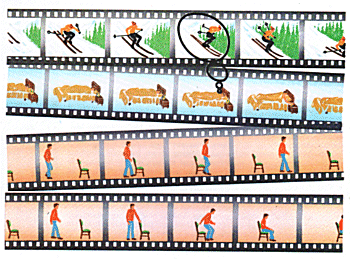 |
Taken to its logical conclusion, this view of reality argues that we have complete control over our destiny, because literally anything is possible, and happens some where among the infinite array of parallel universes. All we have to do is find a way to travel across the time barrier, not forwards or backwards but sideways in time. It is, of course, much easier said than done; but if physical time travel remains at the very least an unlikely prospect for us, there remains the intriguing possibility that dreams, ghosts and other phenomena classified as paranormal experiences could be just as well - perhaps better - explained in terms of information somehow leaking into our world from parallel worlds of time as by direct communication, involving time travel, from the future or past of our own timeline.
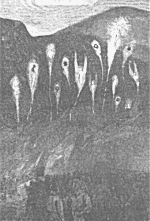 An
absurd illusion
An
absurd illusion
One of the most startling philosophical theories sees everything as
being in the mind. Sir Fred Hoyle, an eminent astronomer who has a penchant
for speculation and science fiction, mentioned this idea in a serious scientific
book, Ten faces of the Universe, and elaborated on the theme in his
science-fiction novel October the first is too late. 'Time like an
ever-rolling stream bears all his sons away' - the image of time conveyed
by the famous words of the ninetieth psalm - is 'a grotesque and absurd
illusion'. In fact, all the events that we imagine making up
the flow of time- as well as all other
imaginable events - exist in a kind of infinite sorting office, with each
event, or state, in its own pigeon hole. Hoyle goes on:
Suppose that in each of these states your own consciousness is included. As soon as a particular state is chosen, as soon as an imaginary office worker takes a look at the contents of a particular pigeon hole, you have the subjective consciousness of a particular moment, of what you call the present. Think of the clerk in an office taking a look, first at the contents of one pigeon hole, then at the contents of another. Suppose he does this, not in sequence,but in any old order. What is the effect on your subjective consciousness? So far as the clerk himself is concerned, he's jumping about all over the place among the pigeon holes. So your consciousness jumps all over the place. But the strange thing is that your subjective impression is quite different. You have the impression of time as an ever-rolling stream.
We may all, in fact, be experiencing time travel, as well as travel between different possible universes - but, because one of the rules of the game is that the clerk in the office can look at only one pigeon hole at a time, we never know it.
| Right: Rod Taylor stars in the 1960 MGM film The time
machine, based on the novel by H. G. Wells. Such stories raise an exciting
question: could it be that mankind will one day be capable of building a working time machine? |
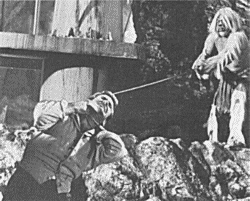 |
True or not, theories such as these show that there is more to time than we may suppose - and that there are, philosophically speaking, ways round the paradoxes of time travel. And if there are ways round the paradoxes, there is no logical reason why it should not be possible one day to build a physical time machine.
One scientist believes he has designed a time machine that will really work. See page 1534
Timeless What is Time? The Flow of Time Entropy and the Arrow of Time Timeslips
Reproduced from THE UNEXPLAINED
p1510